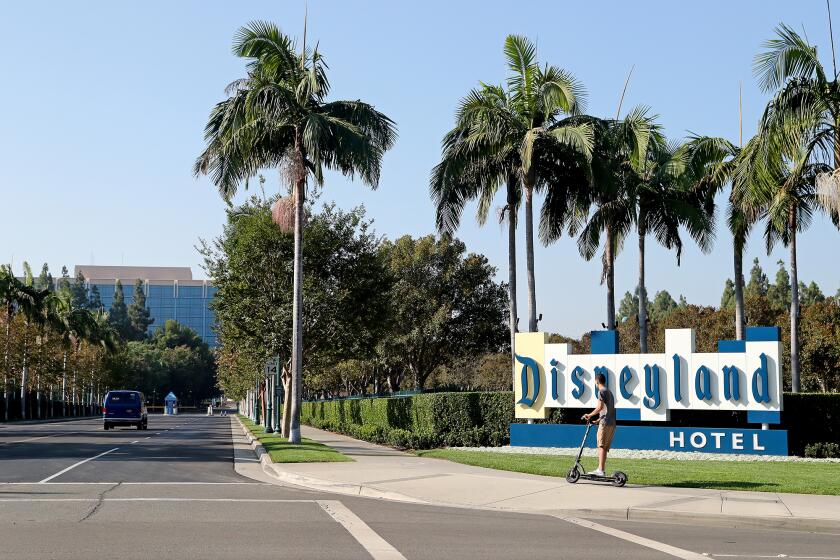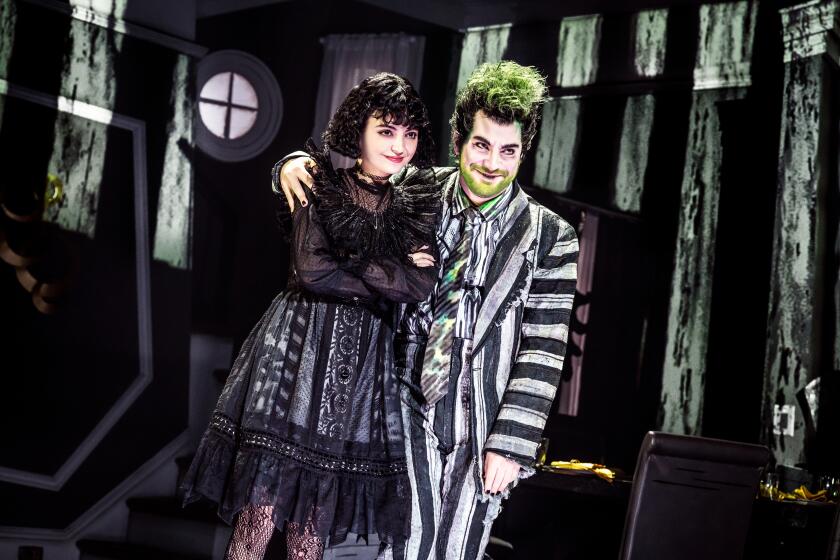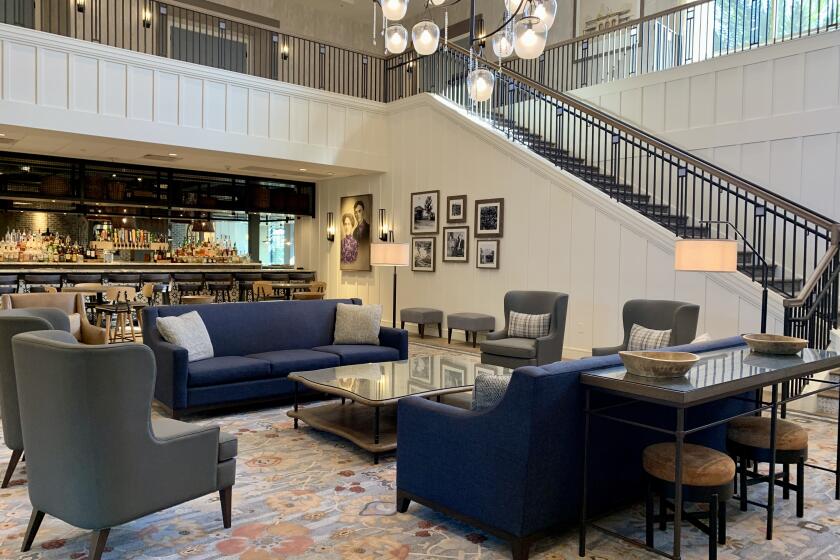Quinceañera dress shops, a staple of Santa Ana, are leaving a changing downtown
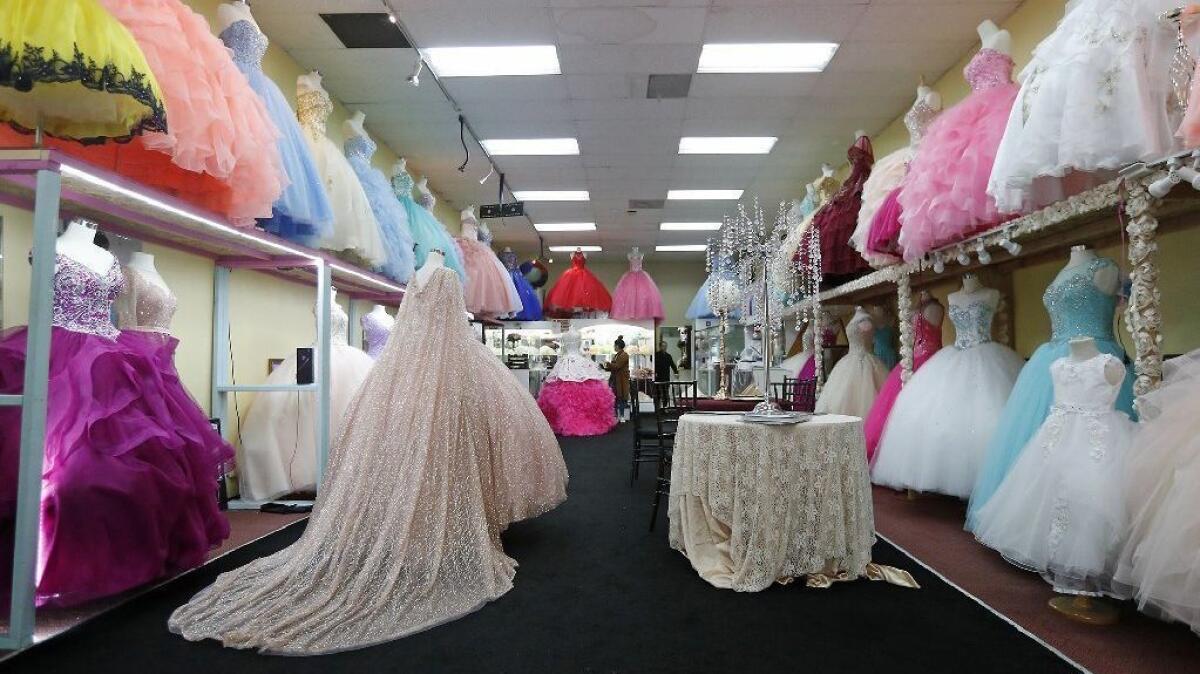
Minerva Alvarez learned to cut fabric as a middle-schooler in her native Cuernavaca, Mexico. She began making simple dresses in class and soon elevated to creating elaborate quinceañera designs.
“It’s the style I enjoyed the most. It was the prettiest, with much more detail, with much more love,” said Alvarez, who runs Shelsye’s Bridal in downtown Santa Ana.
Nearby, Sandra Cerpas honed her craft as a youngster with the help of nuns in her church in Michoacán, Mexico. The church would offer free tailoring classes in exchange for small donations.
“We would take fruit or honey to learn,” said Cerpas, who operates Cassandra’s Bridal.
Alvarez and Cerpas are business owners who run quinceañera shops on 4th Street, a commercial district that for years catered largely to Spanish-speaking Mexican immigrants. The women order their dresses in bulk from designers and companies in Mexico, Germany and New York City. They also design and make their own gowns.
They sketch and stitch patterns, build paper models, cut fabric and piece together layered dresses with elaborate ruffles. It’s a work of art that requires craft, skill and time.
As artist Saskia Jorda — who in a 2013 art installation explored quinceañera tailoring traditions through interviews with shop owners in downtown Santa Ana — phrased it, “It’s like each one had their secrets.”
This skill set and tradition has been slowly disappearing from downtown Santa Ana, which for years hosted a cottage industry for the dresses intended for Latinas celebrating their 15th birthdays. Quinceañera shops lined 4th Street by the dozen.
Now, they’re either moving to other parts of the city, or outside of the county, as trendy restaurants, bars and clothing boutiques continue to set up shop in a rapidly gentrifying neighborhood.
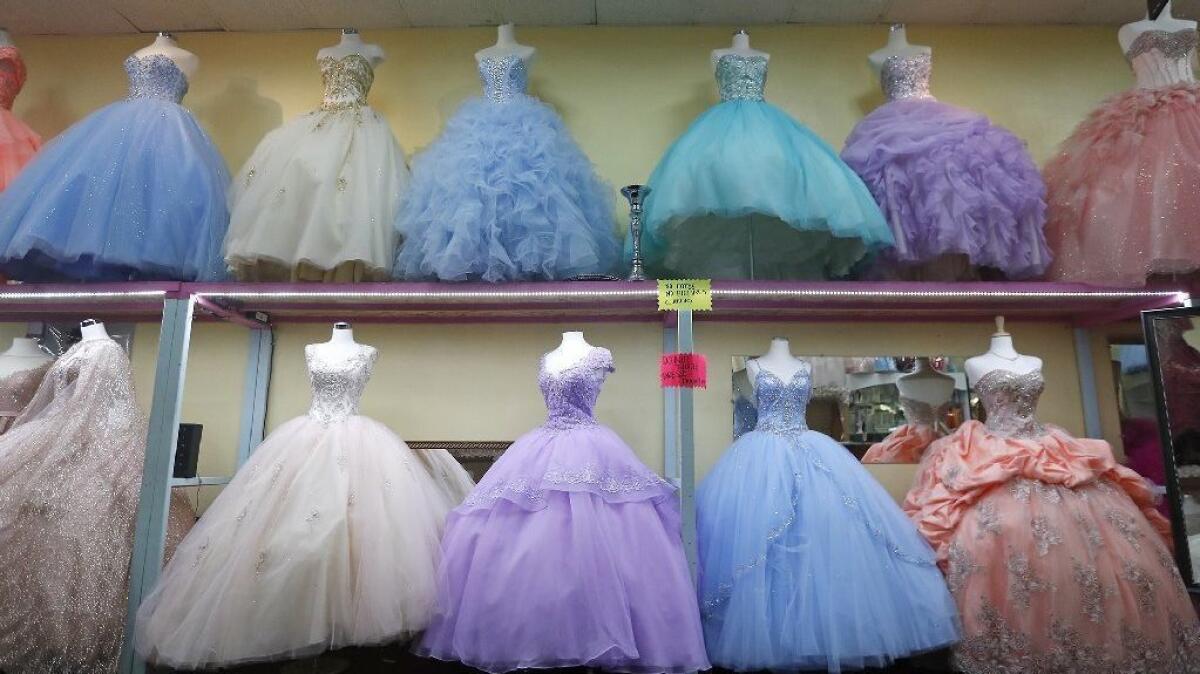
Marilynn Montaño, who works as a barista in the downtown area, documents the closure of long-time businesses — including quinceañera boutiques — by posting photos of the empty shops on Instagram. In one photo, she features a young woman wearing a quinceañera dress, posing in front of an empty boutique. A yellow, handwritten sign declares the shop’s moved to Huntington Park.
“I started to document them because in a couple years, this is just going to be a memory to someone,” said Montaño, 25.
“We don’t consider these quinceañera shops, the people who make these dresses, as also artists,” Montaño said. “When we say, `Support artists,’ we think of visual artists at galleries, but they’re also artists. They’re also makers. That’s a craft.”
District once likened to plazas in Mexico
Downtown Santa Ana, particularly the area around 4th Street, has in the past been likened to vibrant shopping plazas in Mexico.
As the Mexican immigrant population surged in the ’80s, 4th Street — known as Calle Cuatro — reflected the demographic shift. Between 1960 and 1980, the city’s foreign-born population grew from 7% to 30%, according to the 2017 book “Latino City: Urban Planning, Politics, and the Grassroots.” Now more than 78% percent of the city of 334,000 is Hispanic or Latino.
Travel agencies specializing in airfares to Mexico and Latin America, jewelry stores, shoe and clothing shops became the norm downtown, wrote Cal State Fullerton associate professor Erualdo González, the author of “Latino City.” Bridal stores, widely recognized for selling quinceañera dresses, boomed.
In 2014, the demand for such business was so high that “of the people that are here now that I know, almost all of them were ex-employees of bridals, and now they have their own store,” one quinceañera shop owner recalled in the book.
“I counted all of them on 4th Street one day, something like 30, 35,” she said.
But the dress shops have gradually become less visible in recent years.
In the ’90s, Artists Village began taking shape near 1st Street and Broadway when Cal State Fullerton’s Grand Central Art Center moved downtown. Bars and restaurants followed.
By 2011, a slew of changes contributed to downtown’s mixed identity.
The E. 4th Street area known as Fiesta Marketplace was re-branded as East End, and with that came the Frida Cinema, Native Son Alehouse and an artisan food hall, 4th Street Market.
Downtown developer Ryan Chase said he rebranded the area to broaden its appeal beyond its core Latino clientele.
‘We have been here’
To Alvarez, the struggle to stay afloat goes beyond the gentrification narrative often told in Santa Ana, where it’s new versus old. She doesn’t see herself in competition with “los Americanos.” Alvarez said she had one of her best sales years in 2018, when she was delivering about 10 dresses a week.
She’d just like to feel her line of work is as valued as the newer bars and restaurants. Residents in the past have protested the number of alcohol licenses.
“Hopefully the city can help us because we have been here longer than those who are just arriving,” Alvarez said.
Julie Castro-Cardenas, acting assistant to the city manager, said the city is “conscious about the culture of the community.”
“We certainly have an ear to all residents,” Castro-Cardenas said. “We don’t cater to one group. We are intentional about having a balance.”
Castro-Cardenas said that about four years ago the city created a downtown liaison position between merchants and City Hall, a job she claims has been plagued by high turnover. She also noted a 2017 resolution the city adopted in support of worker cooperatives — businesses owned by workers who share the profits. And in December, the city approved $100,000 each for the Santa Ana Business Council, which supports 4th Street businesses, and Downtown Inc., which manages the area’s restaurant association.
Like Santa Ana, cities nationwide are grappling with how to address displacement and preserve their cultural districts. In San Francisco, for example, the Board of Supervisors in May passed legislation to establish clear definitions of cultural districts in order to provide funding for them.
To González, author of “Latino City,” solutions need to go beyond cultural preservation.
“You have to put front and center the class element,” he said.
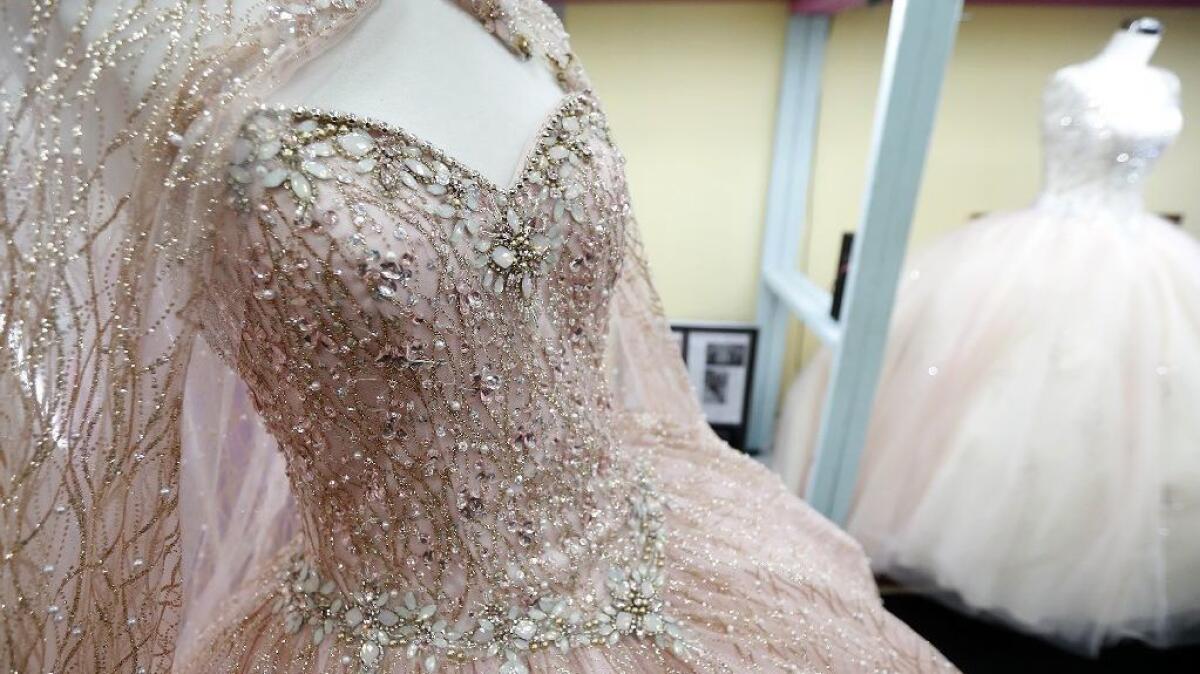
Upscale Mexican restaurants or expensive bridal boutiques would jibe in a culturally Mexican district, but González questioned whether they would serve the area’s working class. “Gentefication” — which happens when professional, college-educated Latinos return to and invest in their neighborhoods — is a class issue, he said.
“And the way the models are being divided across cities, it’s going to be favoring pockets,” González said.
Garnering attention for the district
On a recent Friday, Alvarez displayed a layered quinceañera dress she designed to reflect the popular Mexican charro style. The dress was embellished with fuchsia sheer ruffles below a silk-like, white fabric decorated with pink stitched flowers, stems and horseshoes. Gold-colored buttons on the embroidered corset completed the cowboy look.
Alvarez sketched the design using inspiration from other styles.
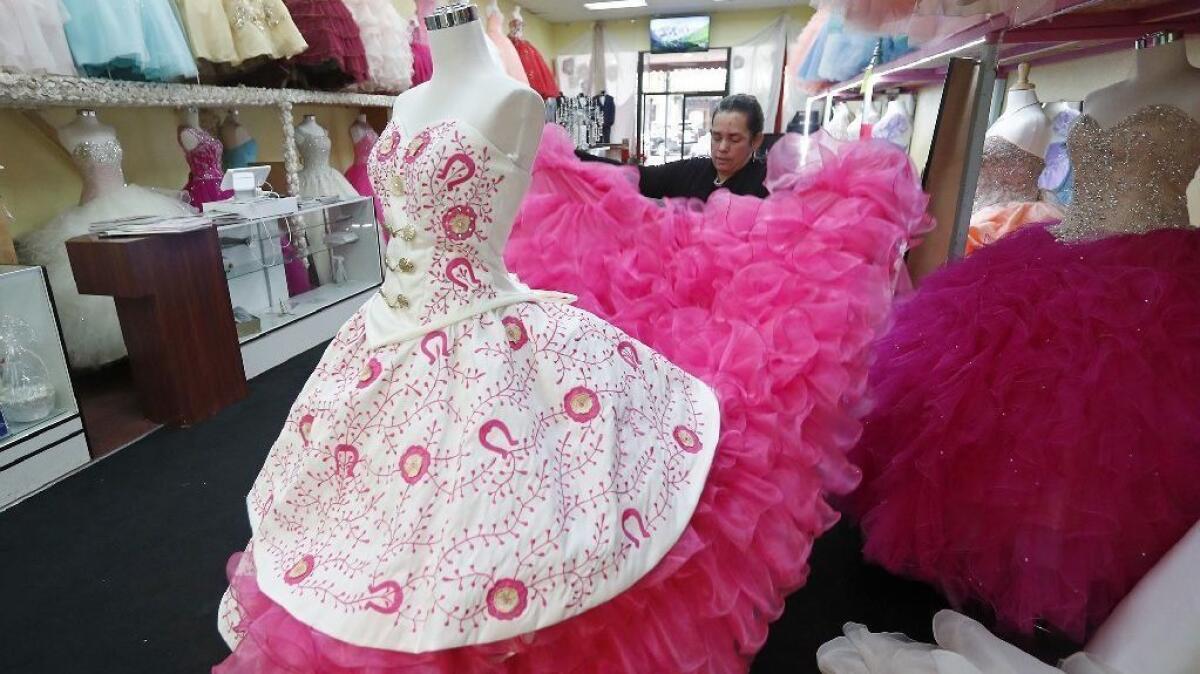
“We can make them in different colors,” she said.
Alvarez began working at a 4th Street bridal store when she was about 19 years old, just two months after she left Mexico. She began running the shop after the owner left her the business when he moved out of state.
Alvarez said she is reinventing her business. She hopes to partner with high school students to help her with social media marketing. She’s also planning a grand re-opening, where young women will model custom dresses. She recently moved to a new 4th Street location after the property owner sold the space she rented.
“What would be the most helpful would be more publicity,” Alvarez said.
Montaño, who has also been an anti-gentrification activist, challenged herself and others to think differently when it comes to the way they shop. Instead of going to Macy’s for a gown or dress, a Latina-owned quinceanera boutique would be an alternative, she said.
“I’m pretty sure you can ask them for some other type of dress for a different occasion,” she said. “Think creatively because these people, if you don’t support them, of course they’re going to go away.”
“We also need to put our money where our mouth is,” Montaño said.
Alejandra Molina is a contributing writer for Arts & Culture at Voice of OC. She can be reached at molina.alee@gmail.com.
All the latest on Orange County from Orange County.
Get our free TimesOC newsletter.
You may occasionally receive promotional content from the Daily Pilot.
